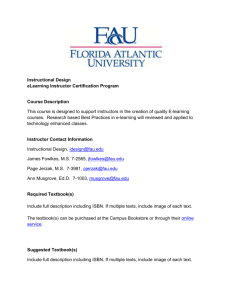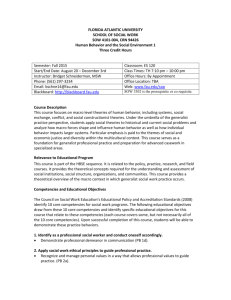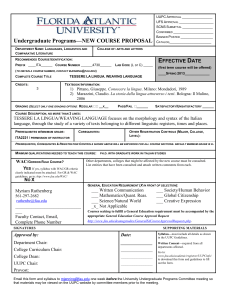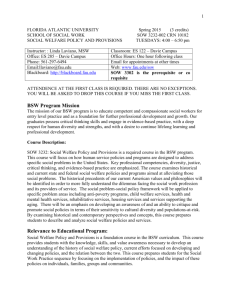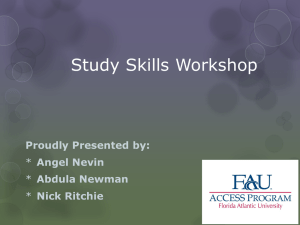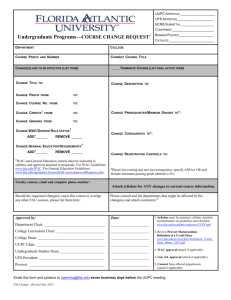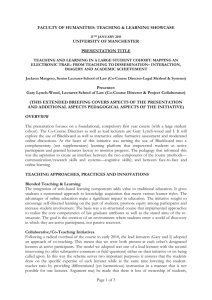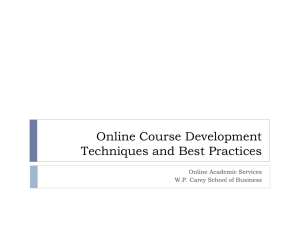ESC 2070 * The Blue Planet - Florida Atlantic University
advertisement
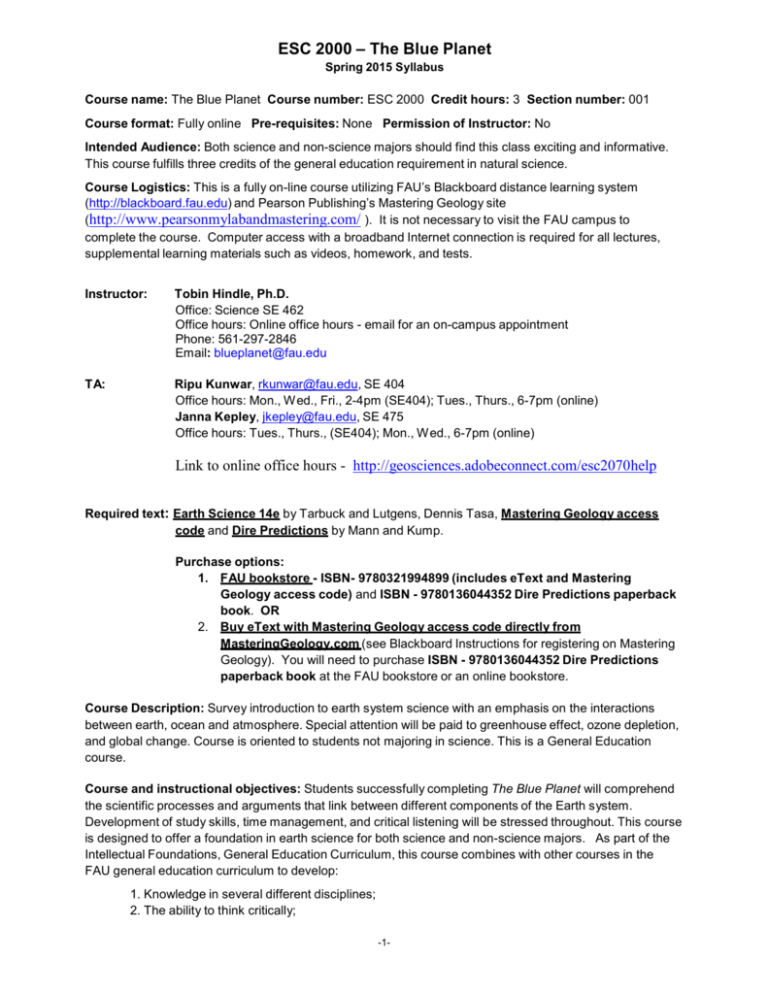
ESC 2000 – The Blue Planet Spring 2015 Syllabus Course name: The Blue Planet Course number: ESC 2000 Credit hours: 3 Section number: 001 Course format: Fully online Pre-requisites: None Permission of Instructor: No Intended Audience: Both science and non-science majors should find this class exciting and informative. This course fulfills three credits of the general education requirement in natural science. Course Logistics: This is a fully on-line course utilizing FAU’s Blackboard distance learning system (http://blackboard.fau.edu) and Pearson Publishing’s Mastering Geology site (http://www.pearsonmylabandmastering.com/ ). It is not necessary to visit the FAU campus to complete the course. Computer access with a broadband Internet connection is required for all lectures, supplemental learning materials such as videos, homework, and tests. Instructor: Tobin Hindle, Ph.D. Office: Science SE 462 Office hours: Online office hours - email for an on-campus appointment Phone: 561-297-2846 Email: blueplanet@fau.edu TA: Ripu Kunwar, rkunwar@fau.edu, SE 404 Office hours: Mon., W ed., Fri., 2-4pm (SE404); Tues., Thurs., 6-7pm (online) Janna Kepley, jkepley@fau.edu, SE 475 Office hours: Tues., Thurs., (SE404); Mon., W ed., 6-7pm (online) Link to online office hours - http://geosciences.adobeconnect.com/esc2070help Required text: Earth Science 14e by Tarbuck and Lutgens, Dennis Tasa, Mastering Geology access code and Dire Predictions by Mann and Kump. Purchase options: 1. FAU bookstore - ISBN- 9780321994899 (includes eText and Mastering Geology access code) and ISBN - 9780136044352 Dire Predictions paperback book. OR 2. Buy eText with Mastering Geology access code directly from MasteringGeology.com (see Blackboard Instructions for registering on Mastering Geology). You will need to purchase ISBN - 9780136044352 Dire Predictions paperback book at the FAU bookstore or an online bookstore. Course Description: Survey introduction to earth system science with an emphasis on the interactions between earth, ocean and atmosphere. Special attention will be paid to greenhouse effect, ozone depletion, and global change. Course is oriented to students not majoring in science. This is a General Education course. Course and instructional objectives: Students successfully completing The Blue Planet will comprehend the scientific processes and arguments that link between different components of the Earth system. Development of study skills, time management, and critical listening will be stressed throughout. This course is designed to offer a foundation in earth science for both science and non-science majors. As part of the Intellectual Foundations, General Education Curriculum, this course combines with other courses in the FAU general education curriculum to develop: 1. Knowledge in several different disciplines; 2. The ability to think critically; -1- 3. The ability to communicate effectively; 4. An appreciation for how knowledge is discovered, challenged, and transformed as it advances 5. An understanding of ethics and ethical behavior. General Education Curriculum, Foundations of Science and the Natural World: Scientific principles are behind what we find in nature and in natural occurrences. Scientific issues, such as those dealing with stemcell research, cloning, and global warming, are hotly debated by policy makers. Courses that meet this requirement share the goal of seeking to understand patterns and principles behind phenomena and occurrences, both in the inorganic world and in the living world. They typically fall within either the physical sciences (Astronomy, Physics, Chemistry, and the Earth Sciences) or the Biological sciences. Students who satisfy the Science and the Natural World requirement will demonstrate: 1. An understanding of the nature of science, including important principles and paradigms; 2. An understanding of the limits of scientific knowledge and of how scientific knowledge changes; 3. An understanding of the nature of scientific inquiry and its ethical standards, in particular how to pose questions and how to develop possible explanations; 4. An ability to discern claims based on rigorous scientific methods from those based on illogical or incomplete scientific methods. Method of instruction: All course material, homework and tests can be accessed over the Internet at home or at other accessible sites, so long as the computer has broadband/high speed Internet access. The primary method of instruction is through the use of online lectures that include visual slides with audio narration. Online lectures must be viewed on machines equipped a modern web browser, Flash 11.2 plugin or newer and sound. You might want to bring along earphones to the student labs for convenience. Many homework assignments require using Google Earth, a free download found at http://www.google.com/earth/download/ge/agree.html Online courses delivered over the Internet are convenient for many students. Experience suggests, however, that some students do not understand that in the absence of formal class meetings, lectures, discussion groups, etc., it’s easy to fall behind. Please don’t let that happen to you. I will post weekly workload announcements in Blackboard and send frequent email reminders to help you stay on schedule. You are responsible for taking the online Chapter Homework and Tests during the times they are available. The due dates can be found in the Syllabus schedule, in the Blackboard weekly Announcements and in the Leaning Module folders. Homework dates are also listed in the Mastering Geology Calendar. Equally importantly, but much less obviously to some students - you’ve got to keep up with the readings and lectures. It’s next to impossible to play catch up in an earth science course. Students who start to fall behind discover that they begin falling behind at an ever faster rate. This can happen in a traditional lecture format course, too, but since in those settings, we gather together a few times a week, it’s easier for everyone to realize something’s going wrong. Not so in a course delivered over the Internet. The FAU Blackboard site acts as a gateway to the online lectures, chapter homeworks and tests. Because this course is delivered exclusively online, students must submit the assignments through the Blackboard and Mastering geology sites where they will be graded automatically. IT IS REQUIRED THAT YOU PRINT AND RETAIN THE SCORE CONFIRMATION PAGE AFTER SUBMITTING EACH ASSIGNMENT. If there is ever a question of Blackboard recording your test grades properly, your printed confirmation page is the only way to document your work. -2- Course Assignments: Each week, an announcement will be posted on Blackboard detailing the specific assignments for that week. In general, you should first read the chapters for the week, then listen to the corresponding lecture, watch any supplemental videos, complete the assigned chapter homework and then take the Module test. A table outlining the class schedule is available in the Syllabus provided on FAU’s Blackboard site. Please note that the assignment deadlines listed in the schedule are subject to changes that will be announced using Blackboard. Students are responsible for reading these Announcements on a weekly basis. Reading Assignments: The reading assignments listed in the class schedule should be completed prior to viewing the lecture during which the material will be discussed. Trust me on this one; the lecture material makes much more sense if you have read the textbook first to set a context for understanding where the lecture material fits. Online Lectures: This course makes use of web-based lectures to deliver material normally presented in a traditional classroom format. These lectures last approximately 35 to 40 minutes each. The good news is you don’t have to view a whole chapter at one sitting and can be viewed at your own pace. Chapter Homework: After viewing an online lecture, students must then complete the Chapter Homework located on the Mastering geology site, http://www.masteringgeology.com . The chapters are organized so that each contains roughly the same amount of material as a traditional classroom lecture session. You can attempt each Homework question 4 times, but you are deducted 15% for each incorrect multiple choice answer, 5% for all other types of answers. Most questions have a "hint" button available that you can use with NO answer penalty and a 5% bonus for not using any hints. After 4 incorrect answers, the correct answer will be displayed for you. Supplemental Material: Some learning modules contain required videos to watch in addition to the lectures. Study aids: Mastering Geology contains non-graded Review Questions and a Study Area with study aids that should be reviewed as part of preparing for each module test. Examinations: Tests will be given as indicated on the schedule and in the Blackboard Announcements. Each covers one Learning Module (generally one textbook unit) and is not cumulative. These on-line Tests are timed (50 minutes), must be completed in one, continuous sitting, and can be taken only 1 time. Each Test is comprised of 40 multiple-choice and true/false questions. Although tests are inherently “open-book” examinations, their limited time allotment require strong preparation from students (i.e., students won’t have enough time to “open” the book for every question). Therefore, you should study for the Module test as you would for a traditional classroom based, closed book exam. In the case that a student submits a module test exceeding the allotted time period, up to 10 points will be deducted for each 5 minutes that the test is late. Extra Credit: Up to 30 extra credit points can be earned by participating in the Blackboard Discussion Forum. Details of the extra credit requirements are provided in Blackboard. -3- Course Evaluation: The course final grade is composed of the following components: Syllabus confirmation Module 1 Test Module 2 Test Module 3 Test Module 4 Test Module 5 Test Module 6 Test Chapter Homework (total) Total 10 pts 100 pts 100 pts 100 pts 100 pts 100 pts 100 pts 420 pts 1030 pts Grading criteria: This course is graded on the A-F scale. There is no curve applied to final scores in this course. The grade scale is set as below, with scores rounded to the nearest whole percent: Percent Avg 93 - 100 90 92 87 89 83 86 80 82 77 79 Grade A AB+ B BC+ Percent Avg 73 76 70 72 67 69 63 66 60 62 0 59 Grade C CD+ D+ DF Grade postings: Scores are listed in Blackboard under My Grades. You can see your current average and corresponding letter grade for all work submitted at the bottom of My Grades. YOU MUST ALWAYS VERIFY YOUR GRADES ARE BEING POSTED PROPERLY BY CHECKING MY GRADES AFTER COMPLETING EACH MODULE AND KEEPING A PRINTED COPY OF THE SCORE CONFIRMATION PAGE DISPLAYED AFTER SUBMITTING ALL ASSIGNMENTS. Policy on make-ups: Because a generous block of time is provided for completing all homework and tests, it is the student’s responsibility to ensure that they are completed PRIOR to the due date. Makeups with written documentation of a medical or family emergency must be requested as soon as feasible. If you miss a test for unexcused reasons, you lose credit for it unless you contact the instructor within two days of the due date. Unexcused test makeups (homework will not be re-opened for unexcused reasons) may be granted with a 10% or greater late penalty at the discretion of the instructor. If you know that you can’t take an assignment beforehand, be sure to contact the instructor to see if it can be administered at a different time or date. Additionally, since it is always possible to have a computer issue at any time, students should avoid waiting until the last minute to complete homeworks and tests. The “incomplete” grade: The grade of I (incomplete) shall ONLY be given for the reasons listed and under the conditions specified in the FAU course catalog (http://www.fau.edu/academic/registrar/catalog/academics.php). Electronic mail is a critical communication tool in any web-based college course! Please note that this course conforms to the FAU student email policy. All course-related email will be sent to your FAU email account. All students must regularly (at least three times weekly) access their FAU email accounts, as well as Blackboard for announcements and scheduling information! You can normally expect all emails to the instructor to be replied to within 48 hours. -4- Academic integrity: Students at Florida Atlantic University are expected to maintain the highest ethical standards. Academic dishonesty, including cheating and plagiarism, is considered a serious breach of these ethical standards, because it interferes with the University mission to provide a high quality education in which no student enjoys an unfair advantage over any other. Academic dishonesty is also destructive of the University 6 community, which is grounded in a system of mutual trust and places high value on personal integrity and individual responsibility. Harsh penalties are associated with academic dishonesty. For more information, see University Regulation 4.001 at http://www.fau.edu/ctl/4.001_Code_of_Academic_Integrity.pdf You must never represent the work of another person as your own without acknowledgment. In this course, you may work together in study groups and may help one another with the homework assignments. However, during the tests you may use your lecture notes and the textbook ONLY, and may NOT collaborate with others. If you have any questions regarding interpretations of academic integrity rules, be sure to see the instructor. Course etiquette: As this is a fully online course, students must use good netiquette, which is proper or polite behavior on the internet. How we communicate to each other is very important in this course. In order to maintain a positive online environment for our class, we all need to follow the netiquette guidelines: Show respect for the instructor and for other students in the class; Respect the privacy of other students. (no spamming student emails); Express differences of opinion in a polite and rational way; Avoid bringing up irrelevant topics when involved in group discussions; Use mainly lowercase in their messages with proper capitalization rules followed (use of all uppercase in a message is the equivalent of shouting and is considered offensive; Use appropriate language in messages that are conversational and positive in nature and not threatening or offensive Special accommodations: Athletes competing in sports this semester should be certain that their academic advisor is aware of the course assignment schedule and contacts the instructor as soon as possible if there are conflicts. Since all assignments can be completed online from any Internet connected computer, extensions are not generally provided for “away” games and competitions. Students with disabilities: In compliance with the Americans with Disabilities Act (ADA), students who require special accommodation due to a disability to properly execute coursework must register with the Office for Students with Disabilities (OSD) - in Boca Raton, SU 133 (561-297-3880); in Davie, MOD 1 (954236-1222); in Jupiter, SR 117 (561-799- 8585); or at the Treasure Coast, CO 128 (772-873-3305) – and follow all OSD procedures. -5- ESC 2070 Schedule Chapter Reading Assignments Week Start Dates 1 01/05/15 01/09/15 Getting Started with The Blue Planet Chapter 1: Introduction to Earth Science 1 2 01/10/15 01/16/15 Chapter 2: Matter and Minerals 2 01/16/15 3 01/17/15 01/23/15 Chapter 3: Rocks, Matelials of the Solid Earth 3 01/23115 01/21/15 01/23/15 Module 1 Test 4 01/24/15 01/30/15 5 01/31/15 02/06/15 02/04/15 02/06/15 6 02/07/15 02/13/15 7 02/14/15 02/20/15 02/18115 02/20/15 8 02/21/15 02/27/15 9 02/28/15 03/13/15 Chapter 15:The Dynamic Ocean 03111/15 03113/15 Module 4 Test 03/14/15 03/20/15 Temperature End Dates Topicsllectures Chapter 4:Weathering, SoiI, and Mass Wasting 4 Chapter 5:Running Water 5 Chapter 5:Groundwater 5 Chapter 6:Glaciers, Deserts, and Wind 6 Chapter 7:Plate Tectonics,A Scientific Revolution Unfolds 7 Chapter 8:Earthquakes and Earth's Interior 8 Chapter 9:Volcanoes and Other Igneous Activity Chapter 10: Crustal Deformation and Mountain Building 01/30/15 02/06/15 9 10 02/06/15 02/13/15 02/20/15 7- 10 Module 3 Test Chapter 13:The Ocean Floor 13 Chapter 14: Ocean Water and Ocean Life 14 l?l 15 02/20/15 02/27/15 03/13/15 13- 15 Chapter 17: Moisture, Clouds, and Precipitation 11 01/23115 4-6 Module 2 Test 16 17 Chapter 18: Air Pressure and Wind 18 Chapter 19: Weather Patterns and Severe Storms 19 03/21/15 03/27/15 03125/15 03127/15 Module 5 Test 12 03/28/15 04/03/15 Chapter 20: World Climates and Global Climate Change 13 04/04/15 04/10/15 Dire Predictions: Parts 1, 2, 3 14/15 04/11/15 04/17/15 04/23115 04/25/15 03/13115 03/20/15 03/27/15 16- 19 Dire Predictions: Parts 4, 5 Movie:The 11th Hour -6- 03/27/15 20 04/03/15 Parts 1, 2 and 3 04/10/15 Parts 4 and 5 04/17/15 20, Parts 1-5 Module 6 Test Test due dates 01/16/15 1 -3 Chapter 16:The Atmosphere, Composition, Structure, and 10 Homework due dates 04/25/15

